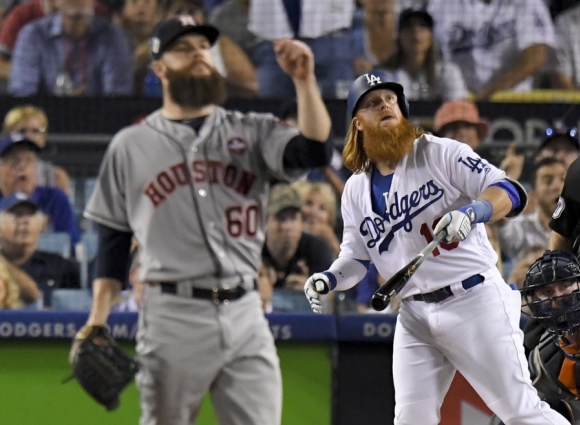World Series: Kershaw, Dodgers Make Quick Work; Take Game 1

The Los Angeles Dodgers weren't the only ones going to bed happy last night.
The Commish of Time & Space must've done, too.
In fact, any and all of them -- plus fans who attended Game 1 -- probably had time to hit a late showing at the cineplex after the fastest World Series game since 1992 wrapped.
It was indeed a great occasion for timeliness, what with the temp at game time clocking in at a torrid 103°.
Yes, this was a job for Clayton Kershaw, with supporting help from Houston ace Dallas Keuchel.
| IP | H | R | ER | BB | K | |
| Kershaw ... | 7.0 | 1 | 1 | 1 | 0 | 11 |
| Keuchel ... | 6.2 | 6 | 3 | 3 | 1 | 3 |
Kershaw got even more starting help from Chris Taylor and NLCS MVP Justin Turner.
The result was a clinically efficient 2-1 Dodger victory:
There's no doubt the übergeeks in MLB's front offices have taken the game's efficiency to new levels, but it's nothing the 2016 World Series didn't see:
- The Cubs' Joe Maddon worked with LA's current front-office seamheads Andrew Friedman and Farhan Zaidi, who used advanced metrics at Tampa Bay to keep up with the game's big spenders; and
- The Indians pioneered the practice of going geek to identify a future core four of players early and make deals to supersede their arbitration years.
Old School does weigh in every now and then, of course.
Not everything fits a formula.
However, managers and coaches nowadays ignore seamheads at their peril.
Case in point: St Louis Cardinals pitching coach Derek Lilliquist never really incorporated advanced stats into his thinking. He's now the club's former pitching coach.
And so it goes.
Still, those aren't automatons out on the field. Geeks continue to research measurements for intangibles like Turner's inner fire and Kershaw's zoned-in mindset.
They just haven't gotten there yet.
And baseball still tests for that stuff.

